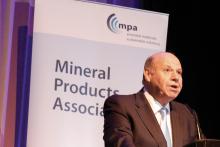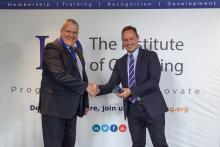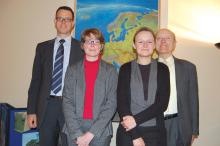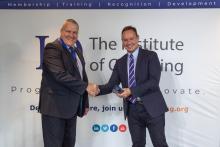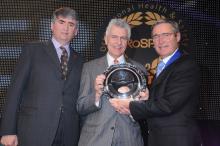
Safety and competence are top of the agenda for the Institute of Quarrying’s president Martin Isles. Claire Symes met him to talk about his first year in office
Presidency of an international industry professional institution calls for someone with a clear view of the sector and many years experience of the factors affecting the market. This is exactly what the
Isles is combining this role with his full-time position of director of health and safety for the UK’s
The Institute of Quarrying was formed in 1917 and has over 5300 members in 30 countries across the globe. Although the organisation started as an association of quarry managers in North Wales, nowadays only around 50% of its members are employed in the UK with affiliated bodies or branches in Australia, Hong Kong, Malaysia, New Zealand and South Africa, boosted by the more recent emergence of an energetic Middle East Group.
He first joined the institute in 1975. “You had to be a member to be able to take the professional exams” he recalled. “In the 1970s there were a much larger proportion of independent quarry owners who were members of the institute which was the main avenue for learning and debate.”
“Trade associations existed but were smaller and fragmented. Nowadays by comparison, the trade associations are stronger, especially the MPA which represents a high proportion of the operating companies and justifiably draws particular strength from its widespread membership of the smaller independent companies. The institute, on the other hand, is focused on the individuals and their professional education and occupational wellbeing.”
Isles was invited to join the IQ Council back in 1989 and has served in a number of posts and was elected as president last year from the position of deputy president.
He took over the role from David Sharman, Corporate Director for
Isles splits his time between the MPA’s offices in London and Camberley and travelling to meetings and sites all over the UK. Lobbying in Brussels is also one of his key front line activities, where the European Aggregates Association, UEPG, is building a well-founded reputation as a trusted and influential partner of the
“Our recent focus in Brussels has been to appraise the giant construction sector of the real & sustained benefits to workers & employers that would accrue if that sector does decide to join the EU ‘Silica’ Social Dialogue Agreement. We hope
they will”
Industry experience
Isles is the first IQ president drawn from a trade association rather than the more conventional sourcing of someone working directly for a quarry operator. However, Isles has extensive experience at the quarry face although initially he wanted to be a meteorologist rather than a quarryman.
“I have always been interested in the dynamics of the weather,” he said. “I studied physics and maths at Dundee University in Scotland and it was there that my interest swung toward the even more colourful subject of geology. Here one grapples with the very genesis of our planet and its scientifically-proven evolution. A geologist has inbuilt respect for the Earth and all its natural resources. “People don’t always realise that the Earth is one big recycling centre, continually changing its surface manifestation. The incontrovertible reality is that the quarrying industry does not “consume” natural resources, instead it merely extracts, processes and moves materials from one place to another, to satisfy the demands of human Society.”
“My first experience of geological heritage on a grand scale was seeing the former vast Westfield opencast coal site in Fife in the east of Scotland, where thick seams of high grade coal were clearly visible in their three-dimensional forms. It was this open-air vista, coupled with, it has to be said, the sight of large excavators feeding a seemingly endless fleet of big dump-trucks that fired what was to become my enduring enthusiasm for the quarrying and mineral products industry.”
Isles went on to get an honours degree in geology and subsequently carried out research into the effects of aggregates & cements on concrete, leading to a masters’ degree in civil engineering. His first job in the industry was for Wimpey Asphalt as a roving geologist and trainee quarry manager.
It was his first job in a quarry that highlighted the safety challenges the industry was facing at the time.
“Starting off on the tools in 1973 at Darlton Quarry in the English Peak District, I quickly realised the power and potential of those tools and the unforgiving nature of the carboniferous limestone they were pitted against, bringing about an early awareness of the need to look after yourself and your fellow workers,” he said.
Isles then moved to the Middle East, firstly to Kuwait and then to Dubai to manage the nightshift of what was then the Middle East’s largest rock quarry. He also worked in the emirate of Fujairah before returning to work for Wimpey Asphalt in London managing two busy asphalt plants. From there he moved to take charge of Wimpey’s Pant Quarry in North Wales.
“In those days a Wimpey quarry manager was responsible for everything – production, technical, commercial, planning, health and safety, labour relations, community relations, environmental probity, and so on” he said. “It was an exhilarating job, which later extended to encompass all Wimpey’s North Wales activities covering dolerite, limestone, sand and gravel.”
Isles’ first involvement in national health and safety came when he moved to Edinburgh on promotion to divisional technical manager in 1987. “My role covered the UK north of Birmingham and embraced health and safety for all Wimpey’s quarries, asphalt, concrete & block plants, contract surfacing activities and a mastic asphalt business” he said.
“During this time, Wimpey took over Alfred McAlpine Quarries in the UK and formed a joint venture in former Czechoslovakia where the State quarrying industry in Northern Bohemia was being privatised. My involvement in the due diligence process considerably extended my knowledge of continental health & safety practices. It was there that I witnessed the preparation and initiation of a seriously scary ‘heading blast’, a practice long since outlawed in most western countries.”
After a brief interlude as a consultant, Isles joined the British Aggregate Construction Materials Industries (BACMI) in 1996 as ‘environment, health and safety officer’. The following year, the organisation merged with the Sand and Gravel Association (SAGA) to form the Quarry Products Association (QPA), which in 2009 joined forces with the British Cement Association to form the Mineral Products Association (MPA), itself being further boosted by the addition of the
“The concerted ‘push’ on health and safety in quarrying started at the very beginning of the new millennium with the signing by a wide variety of organisations of a voluntary pledge to halve industry injuries in 5 years – I signed on behalf of the QPA”
But it was the professional members of the Institute of Quarrying who set the national occupational standards for safety, health and environment in the industry. Today, the IQ is co-located with the
“In cooperation with MPQC and the IQ, the MPA is working particularly hard on delivering and maintaining a fully competency-assured workforce. Quite simply it’s the right thing to do”
Safety focus
Anyone who knows Isles’ passion for health and safety will not be surprised that this is the main focus of his presidency of the IQ.
“The industry has made tremendous positive strides in terms of health and safety, but to maintain the improving trend it must reach out further and encompass other stakeholders such as the manufacturers of heavy mobile plant – which is where the UK-conceived ‘Safer by Design’ initiative is coming into ever sharper international focus” he said.
Halfway through his presidency, Isles appears to have enjoyed it so far, overhauling on the way the venerable IQ Benevolent Fund which provides financial support to members or former members of the Institute, or their dependents, whose income has fallen below thresholds set by the Fund’s Committee of Management.
Isles uses every opportunity to promote shared values. “The IQ presidency, combined with my roles in the MPA & UEPG, enables me to interact with a truly international spectrum of stakeholders” “We are a global industry with many similar challenges. We must learn from each other if we are to become truly world class. I am determined to push towards that goal.”
The MPA - and the QPA before it - has demonstrated perhaps the greatest sustained injury reduction record of any comparable industry, notching up an impressive 83% reduction from 2000 to 2009 in the UK.
Nonetheless, Isles believes the industry needs better-focused support from government. “I would like to see the reversal of the erroneous and regrettable attitude of successive governments that view health and safety as a burden on industry,” he said. “Quite simply it isn’t!”
After spending an hour in Isles’ company it is hard not to wonder where the Institute will find someone who is as passionate about not just health and safety, but about the whole quarrying industry, to follow in his footsteps. Nonetheless, the IQ members have another year before the next candidate is put to the vote.
Top safety award
The UK’s
At the ceremony Tom Mullarkey, RoSPA’s chief executive, said: “The tremendous contribution that Martin Isles has made to saving lives and reducing injuries in the UK minerals sector is shown by the 83% reduction in reportable injuries he oversaw from 2000-2009. He expresses total commitment to achieving further improvements in safety and health and his enthusiasm, confidence, motivation and integrity are second to none.”
Martin Isles said: “When one looks at the list of past winners of this rare accolade, I am humbled to be in such exalted company. It has re-doubled my motivation to achieve even greater strides to the benefit of all who work at the sharp end in this fascinating yet challenging industry.”

